- Home
- Lynne Connolly
The Making of a Marquess Page 4
The Making of a Marquess Read online
Page 4
He glanced at Honoria. Did his lips curve, did his eyes soften when he looked at her? Dorothea thought so. “Please offer Mrs. Thorpe my best wishes if she recovers before I return.”
And he turned on his heel and left, followed by Lord Evington, who had always been his friend.
A low voice at her side told Dorothea that Sir James had taken advantage of the confusion to move closer to her. “Goodness me,” he said softly, so only she could hear. “If you are free at ten tomorrow, I would appreciate your opinion.” He didn’t have to say where. She already knew.
“Indeed, sir. What a shock! Had you any idea that this would happen?”
Sir James grimaced. “None at all. The new guest certainly made an entrance, did he not?”
“He is the marquess.”
“That,” said the Lord Chancellor’s representative firmly, “remains to be seen. We can assume nothing yet, not until I have ratified the title and written my recommendations. If he carries any title at all, it’s Lord Brocklebank.”
“Surely that is merely a formality?” Lady Steeping pursued. “Oh, it is he, no doubt. Even under the mud of the road I recognized him. He set London on its ear when he appeared at the balls after his grand tour.” She glanced at Mrs. Thorpe. “Everyone said he would win the heart of Mrs. Thorpe, but of course Mr. Thorpe beat him to it.”
Dorothea didn’t know whether to be glad or sad that Lady Steeping hadn’t remembered Ben’s brief connection with her. On the one hand, she didn’t want to be pitied, but on the other, it evidently meant more to her than it did to anyone else.
Mr. Thorpe tenderly carried his wife over to the sofa and laid her on it. Even in a faint the lady was graciously lovely, the silk of her pink gown billowing around her like a protective cocoon. Major Thorpe stood with his hand on the back of the sofa, as if guarding her, but his gaze strayed to Dorothea. He nodded, unsmiling.
Sir James added his mite. “It is not unknown for someone who greatly resembles a missing person to attempt to claim their inheritance.”
“Then you think he is an impostor!” Mr. Thorpe’s color returned, and his eyes sparkled. He seemed positively energized by Sir James’s words.
Sir James stared down his long, patrician nose at Mr. Thorpe. “No, sir, that would be foolish. However, proofs must be obtained.”
“Is not recognition enough?” Dorothea’s brother demanded. “We all know him.”
“Or you think you do.” Sir James lifted a hand. “I wish to be absolutely sure this is the missing marquess. I will set about obtaining signed statements from those people who recognize him, how and from when. You may call him whatever you wish, but to call him Lord Brocklebank is to accept that he is without doubt the missing heir.”
The man was nothing if not meticulous. Fussy, even.
“Oh.” Mrs. Thorpe came to with a graceful wave of her white hand. Her husband helped her to sit up, as she protested apologies. Not a hair out of place, as if she’d fainted in some kind of gossamer tomb. “I am so sorry, I must apologize. Such a vulgar response!”
Someone handed her a brimming glass of red wine. She took a sip, then another larger gulp.
“Think nothing of it, dear lady,” Sir James said. “Such a shock would make the most straitlaced of women fall down in a dead faint.”
Dorothea liked that, but from the approving murmurs, she assumed she was the only person to collect Sir James’s deeper meaning, that Mrs. Thorpe was not at all straitlaced. Or perhaps she was imagining it. It wouldn’t be the first time.
People were talking in small groups, fans wafting or covering faces so words could not be read on their lips. Dorothea remained by the fireplace with her brother and sister-in-law as Sir James drifted away.
“Is he who I think he is?” Ann asked her.
“Yes,” Dorothea answered. Ann had not met Ben in person. “It’s Benedict Thorpe, all right. Lord Brocklebank as ever was, whatever Sir James says.”
Laurence lowered his voice, “I thought Mr. Thorpe would be the first to faint. He went white as chalk when Benedict appeared. Despite his accusations, he knew his cousin on sight.”
“Did you see Louis’s brother?” Ann murmured. “He is completely frozen. One cannot discern what he is thinking.”
Dorothea must write to Angela posthaste. She was staying at a house about fifty miles away, so the message would not reach her for a few days. Perhaps Laurence would let her borrow one of the grooms he’d brought to convey the message as quickly as possible. But she would not talk to him about that now. Better to leave it until later.
Her mind spun with questions. So much to think about. Where had Benedict been? Why had he not returned before now, or even contacted anyone? Had he discovered that his cousin had put forward a claim to have him declared dead?
She voiced none of them aloud. Some would become evident in time, and others...she’d talk to Sir James about those.
Mrs. Thorpe had recovered her composure by the time the marquess—Lord Brocklebank—returned, about fifteen minutes later. Behind him, Lord Evington stood like a guard, although from the size of the newcomer’s frame, he needed nobody to protect him.
He presented a formidable sight, now he had washed off the mud and changed into something more suitable. He wore a wine-red coat of broadcloth with plain gold buttons, and a waistcoat of cream silk striped with a paler shade. His embroidery was limited to the edges of the waistcoat, his buttonholes, and the pocket flaps. Very plain for a society outfit, but the embroidery was gold twill, which made up for the severity somewhat. A gold ring adorned the smallest finger of his left hand. Apart from that, and the gold buckles at his knees and on his shoes, he wore no jewelry. Interestingly, he wore his own dark hair unpowdered. He hadn’t done that before. The style was catching on with the more daring set, but the simplicity of his appearance indicated he had little time for fashion.
For all that, he was every inch an aristocrat.
Benedict Thorpe had put on muscle. His broad shoulders were only the start of a magnificent body, finished with a pair of well-shaped calves and ankles. Whatever Ben had done in his long absence, he had not wasted time on indulgences. His complexion was darker than fashion dictated, indicating hours spent in the open air, and his skin was weathered, roughness apparent on his cheeks and forehead.
He crossed the floor and bowed to Mrs. Thorpe, where she sat, pale faced, on the best sofa. “My apologies for causing you any distress, madam.” When she held out her hand, he bent over it, but not far enough to turn the courtly gesture into a romantic one. “Schultz has advised me that he has added the extra place at the dinner table.” He moved away, leaving her hand hovering in midair. “I requested that he remove the places at the top and bottom of the table. Tonight, we are rudderless until the representative of the Crown makes a decision about the estate.” He bowed to Sir James, who inclined his head in response. “I assume nothing, and since I’ve been known as Mr. Thorpe since I left the country, I’m quite happy to continue in that for a few days more.”
Cleverly done. Benedict had given Sir James the courtesy of ratifying his claim. And he had reduced Louis to the same stature as himself. That negated any advantage Louis had by being the acknowledged heir presumptive to the marquessate for the last seven years.
Louis Thorpe’s low growl could be heard by everyone in the hushed room, but he said nothing.
By custom, the marquess, or Mr. Thorpe, as he must be called for the time being, should lead the highest-ranking lady into dinner, but he made his way over to where Dorothea now sat by her sister-in-law. “Since we are to go into dinner with a lack of ceremony, I would like to request the honor of escorting you, Miss Rowland.”
Dorothea tried not to gape and failed. She closed her mouth with a snap and accepted him by rising to her feet and placing her hand on his arm in the approved manner. Her hand met firm muscle, discernible despite the coat sleeve an
d shirt between them. Ben was so much—more than he’d been before. But she would not forget the way he had abandoned her. Nothing had been confirmed, nothing formally agreed upon, but society, and her family, had an understanding. She had been devastated when he pursued Honoria.
Her response to him now, an instinctive wanting, angered her. Had she lost all pride?
Louis hastily rose and performed a similar office for his wife. Since he was closer to the door, he led the company out. Small recompense, someone murmured as they passed.
“Is something the matter?” Benedict asked her.
“No. Why do you ask?”
He glanced down at her hand. “You appear to be trembling.”
“Really?” She followed his gaze. “How perceptive of you.”
The rumble in his throat signified his amusement—or did it? Not a muscle moved on his features when she glanced at him. Perhaps he was just clearing his throat. “It’s good to see you again, Dorothea.” As if he’d said nothing of significance, he continued, “I have to compliment you on your presence of mind, ma’am. I saw you exchange a few words with Sir James.”
“I’ve known Sir James for a while,” she said mendaciously.
Ben shot her a considering look. “Society is a morass of mutual acquaintances,” he said smoothly as they entered the dining room. “The interconnections are staggering. I will have to relearn much of what I have forgotten, but I daresay a number of helpful people will put me in the way of it.”
They would indeed. Dorothea allowed him to help her sit before he took his place next to her.
His presence overwhelmed her. He radiated confidence, strength, and yes, nobility. Everyone looked at him, even though he had refused to take his rightful place at the head of the table. Nobody would have mistaken him for anything but a man who understood his world and how to control it. But he seemed at ease. His poses were not studied, but natural, although grace prevailed. While he was no longer the laughing youth who’d lit up London’s ballrooms, he’d gained something. If she had to put it into one word, she’d call it power.
She was experiencing a strong set of emotions, few that she could put a name to. Turmoil filled her, her powerful reaction to his return mingling with horror that they’d been about to declare him dead. And Ben, the man, had effortlessly evoked the memories of the young girl she’d put away years ago, together with the dreams she’d had back then. She would not allow them to return. That way led to heartbreak and loss. She would never open herself to anyone ever again, least of all the man by her side.
The table was already set. A plethora of dishes adorned the white linen, the porcelain the finest Chelsea, the hand-painted scenes of the estate lavishly adorned with gilding. Benedict glanced down at his plate. “This is new,” he commented mildly.
“It’s all the rage,” his cousin said, raising his quizzing glass to examine, not his plate or the tureens, but the man sitting next to Dorothea. “I commissioned this set some time ago. Took the ruffians a year to make it. They sent an artist to make views of this estate and the one in Devonshire. They made quite a fuss, but I do think the result is pleasing.”
“Yes,” Benedict said. “And very expensive, I have no doubt.”
A faint chill settled over the table. Nobody discussed expense, not in that way. “But worth it,” Mrs. Thorpe remarked. She had quite recovered from her earlier fainting spell. Color had gathered in her cheeks once more, and the customary light smile that attractively tilted her lips was firmly back in place. “Who counts the cost when the result is so delightful?”
“I do,” he said crisply. He lifted the lid from the nearest dish and offered Dorothea a helping of the contents.
She barely suppressed her shudder. The porcelain might be lovely, but what lay within was the stuff of nightmares. Her nightmares, at any rate. “Thank you, but no,” she murmured. “I am not particularly hungry.”
He glanced at her. “I recall you are not partial to white sauce.”
He’d remembered that? Some people loved the stuff, but Dorothea was not one of them. All those years ago, when they’d attended a dinner and she had eaten very little, he’d noticed, and discreetly arranged for the fish in white sauce to be exchanged with something else. If he did that now, his attention would be commented on, and that was the last thing she wanted.
The dish had no steam rising from it. It must be cold, and a skin was forming on the surface of the food. She wished she had not taken this place, and was thankful, once he had lifted the lid of the other dish, to discover something more palatable. But the mixed vegetables, while acceptable, were also cold.
He sighed, and exchanged a glance with her, while their neighbors helped themselves to dishes. Guests were expected to make their meal out of whatever was nearest to them on the table. Besides, there would be other courses, and a dish of creamed potatoes stood nearby.
Dorothea took a deep draft of admittedly excellent wine to fortify herself for the ordeal ahead. This meal could hardly be anything else. Tensions ran high, not the most pleasant atmosphere for a meal of any kind.
After a few mouthfuls, Benedict sat back, holding his wineglass delicately between his fingers. The facets caught the light from the candelabra that were ranked down the center of the table. Above them the chandelier added more sparkle, its crystal drops polished to a high sheen.
“You have not enquired about the dowager,” Louis pointed out, leaning over to snag a dish of beef.
“No, I have not,” Ben agreed. He glanced across the table at his friend, Lord Evington, who gave him a discreet nod, presumably permission to reveal their continued friendship, as if nobody had seen it before. “Hal kept me informed of events. I asked the butler, who told me my mother keeps early hours. I will pay my respects as soon as she is well enough to receive me.”
The dowager saw nobody these days, after falling ill with a condition not properly explained. She lived quietly and never went out in public. Rumor was that she was mad, or incapable, but the stories varied, so nobody knew for sure. The guests didn’t expect to see her during this visit. With Louis in charge, she might be a prisoner, but his disinterested nod did not speak of someone keeping a woman under lock and key. “I’m sure she’ll appreciate it.” He narrowed his eyes. “If you are the person you claim to be.”
Benedict’s dark, winged brows rose slightly. “You do not object.”
“No, why should I? She enjoys visitors. But do not stay too long, or she will tire.” Louis returned to his meal, seemingly unaffected by the conversation.
Ben picked at his food. For such a large man he surely needed more than he had consumed. Perhaps thinking of his mother did not agree with his stomach.
The servants returned and took the dishes away before bringing in the second course. More tableware from the state service arrived in the footmen’s white-gloved hands. Benedict lifted a finger and at once a footman appeared at his elbow. He murmured something and the footman lifted the dish he’d just set before them, went around the table and placed it in front of Ben’s cousin. Louis glanced up at him, his eyes sparking with an unspoken challenge.
Ignoring his cousin, Benedict lifted the lids on the two dishes nearer to them when the footmen stood back. “We have a dish of lamb chops and one of glazed vegetables. No white sauce in sight. Oh, wait...” The dishes served to Louis were smothered in it.
Dorothea suppressed her smile. Benedict was a perceptive man. Louis picked up his wineglass and leaned back in his chair, his mouth in a mulish pout.
“Neither of us was fond of food covered in white sauce,” Benedict continued. “Once my parents made us eat a pint each when we sent the dishes back from the schoolroom untouched. With nothing to make it interesting. I was—” he broke off, and grinned. “Never mind. It isn’t a subject suitable for the table.”
So Louis had the dishes served to his cousin, knowing he disliked it. That was eit
her spiteful, or some kind of test.
“I still don’t like white sauce,” Benedict said conversationally, smiling. “I have learned to tolerate it, though.”
Louis beckoned to the footman behind him, who obligingly refilled his glass.
“I have not lost my memories of what I left behind,” Benedict said.
Farther down the table Sir James shifted in his chair and exchanged a glance with Dorothea.
“I have heard of cases of men with a remarkable resemblance to a claimant,” Louis said. “I believe it is the custom to test the person.”
A tendon in Benedict’s throat tightened, but to all intents and purposes he remained relaxed. He lifted his knife and fork, and prepared to tuck in to a much more appetizing plateful. Dorothea had beaten him to it. “I believe it is,” Benedict said now. “I am at the disposal of Sir James. I will do anything he wishes to establish my credibility.” Smoothly deflecting the trouble brewing across the table, he addressed Sir James. “I believe people here recognize me and I must have certain memories, is that correct?”
Sir James breathed in deeply. “I believe in cases in dispute, that is the procedure.”
Benedict’s childhood memory was not accidental.
“I regret we must insist.” Louis had regained some of his calmness. His voice had lowered to a normal tone, and his lips were not so tight. “The inheritance is considerable, and we must be sure the right person receives it.”
“Of course,” Benedict replied, and returned to his meal. The tinkle of fork against porcelain recommenced, and people conversed again.
“Did you say you planned a duck hunt for later in our visit?” someone asked Louis, his voice too bright, too obviously intent on changing the subject.
“Indeed. I had thought the gentlemen could leave the ladies to their tea and gossip for a day, unless they wish to come with us.”
Dorothea choked on a quite delicious morsel of lamb. Immediately Benedict turned to her, picking up his glass of water and offering it to her. She held up her hand, warding him off. “Truly I am fine, sir. Thank you for your concern.”

 Boundless (The Shaws)
Boundless (The Shaws) Sinless (The Shaws)
Sinless (The Shaws) The Girl with the Pearl Pin
The Girl with the Pearl Pin Hosts to Ghosts Box Set
Hosts to Ghosts Box Set The Making of a Marquess
The Making of a Marquess Boundless
Boundless Beauty of Sunset
Beauty of Sunset Virginia And The Wolf
Virginia And The Wolf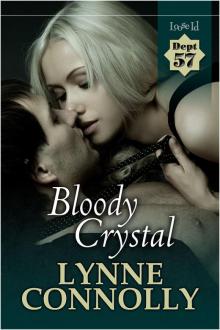 Department 57: Bloody Crystal
Department 57: Bloody Crystal Temptation Has Green Eyes
Temptation Has Green Eyes Forged by Love: Even Gods Fall in Love, Book 4
Forged by Love: Even Gods Fall in Love, Book 4 IntheMood
IntheMood Hareton Hall: Richard and Rose, Book 6
Hareton Hall: Richard and Rose, Book 6 ShiftingHeat
ShiftingHeat Rendezvous at Midnight
Rendezvous at Midnight Yorkshire: Richard and Rose, Book 1
Yorkshire: Richard and Rose, Book 1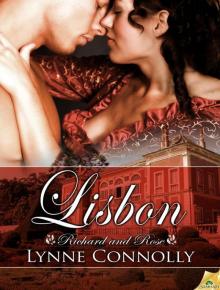 Lisbon: Richard and Rose, Book 8
Lisbon: Richard and Rose, Book 8 Devonshire: Richard and Rose, Book 2
Devonshire: Richard and Rose, Book 2 Venice
Venice War Chest: Even Gods Fall in Love, Book 5
War Chest: Even Gods Fall in Love, Book 5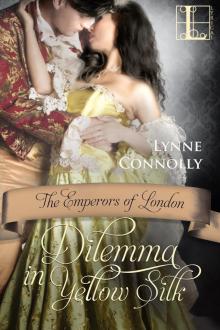 Dilemma in Yellow Silk (Emperors of London)
Dilemma in Yellow Silk (Emperors of London) BornontheBayou
BornontheBayou Dauntless (The Shaws)
Dauntless (The Shaws) Brutally Beautiful
Brutally Beautiful Lightning Unbound: Even Gods Fall in Love, Book 1
Lightning Unbound: Even Gods Fall in Love, Book 1 FascinatingRhythm
FascinatingRhythm Fearless
Fearless A Chance to Dream
A Chance to Dream Mad for Love: Even Gods Fall in Love, Book 2
Mad for Love: Even Gods Fall in Love, Book 2 Sinless
Sinless SailtotheMoon
SailtotheMoon Wild Lavender
Wild Lavender Department 57: Rubies of Fire
Department 57: Rubies of Fire Maiden Lane
Maiden Lane Harley Street
Harley Street Dauntless
Dauntless NicenEasy
NicenEasy It Started at Waterloo
It Started at Waterloo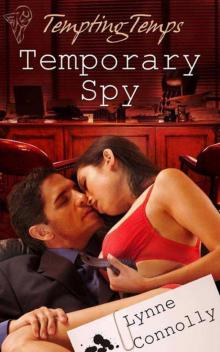 Temporary Spy
Temporary Spy BorntobeWild
BorntobeWild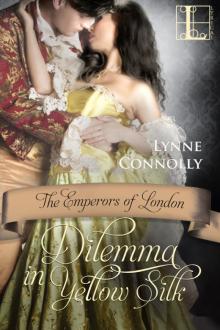 Dilemma in Yellow Silk
Dilemma in Yellow Silk Yorkshire
Yorkshire The Thorndykes 1: Dispossessed
The Thorndykes 1: Dispossessed The Thorndyke Trilogy 2: Dancing at Midnight
The Thorndyke Trilogy 2: Dancing at Midnight Learning to Trust
Learning to Trust Her Quicksilver Lover: Even Gods Fall in Love, Book 6
Her Quicksilver Lover: Even Gods Fall in Love, Book 6 Loving Lucy
Loving Lucy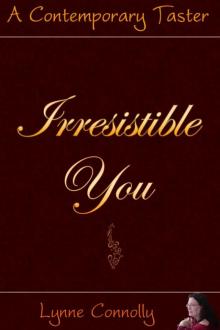 Irresistible You
Irresistible You Arrows of Desire: Even Gods Fall in Love, Book 3
Arrows of Desire: Even Gods Fall in Love, Book 3 Unbroken
Unbroken Devonshire
Devonshire Reckless in Pink
Reckless in Pink Rogue in Red Velvet
Rogue in Red Velvet